All families are different, yet the main principle almost always remains the same. We take care of our family members because we love them, because “family” means helping each other in times of need. However, a mother-in-law from this post on the AITA subreddit doesn’t seem to think that way.
She prompted her son and daughter-in-law to cover the expenses of cleaning, while they were both at the hospital welcoming their newborn son. The new mom asked the internet whether she’s the AH for refusing to pay because, after all, no one asked the MIL to clean. And even if they did, shouldn’t she, as a family member, help them in a difficult time out of kindness?
Some things we do for family members would usually be paid work if done by a stranger, so is it weird to ask your family for compensation for things such as cleaning?
Image credits: aliona2194 (not the actual photo)
This new mom asked the internet whether she was wrong not to pay her MIL for cleaning the house while she was giving birth at the hospital
The married couple only asked the MIL to look after the dogs, but she decided to clean the house. Now she’s asking for reimbursement
Image credits: KostiantynVoitenko (not the actual photo)
The couple sends the MIL a text saying they don’t intend to pay her, she calls them “ungrateful”
Image credits: Vladdeep (not the actual photo)
Image source: Unlikely-Visitor
Providing unsolicited help and then demanding payment for it can be a sign of toxic behavior
Imgae credits: Karolina Grabowska (not the actual photo)
Let’s face it, relationships with in-laws are almost never ideal. It’s no surprise for anyone who’s ever been married that mothers-in-law can often be difficult towards their sons or daughters-in-law. When you’re dealing with a difficult MIL, it’s helpful to look for signs of possibly toxic behavior.
Helping without being asked is recognized by therapists as a trait in toxic mother-in-laws. Licensed clinical social worker Trisha Johnson writes for Choosing Therapy: “A toxic mother-in-law acts this way because she feels that she is the only person capable of doing the job correctly.” Therefore, there’s most likely an ulterior motive: implying that the couple are unable to do the thing or will do it wrong.
What’s important when dealing with a difficult mother-in-law is to understand where she might be coming from. However hard that may sound. Toxic behavior most likely stems from the MIL’s individual issues.
Licensed marriage and family therapist Jennifer Freed tells Hella Life: “People who attach strings to kind deeds don’t really believe others will love them unless they have to. Somewhere along the line, they learned that bribery might sustain a relationship.”
She says it’s important to let the MIL know that you’re always grateful for help, but it’s also crucial to let her know that such behavior makes you feel like you’re in a brokerage, not a family.
One way to avoid this in the future is to spend time with the in-law in a setting where there are no strings attached. It’s important to let the person know you value them not for the help they’re providing, but for what they are.
Toxic MILs can also gossip about you to extended family and friends, in an effort to undermine your voice in the community
Image credits: Marília Castelli (not the actual photo)
Toxic mother-in-laws also tend to gossip. And not just to their friends – to other members of the extended family as well. “This may be her method of trying to spread her version of you as truth, and once again manipulate a situation,” Trisha Johnson writes for Choosing Therapy.
Clinical psychologist Dr. Bethany Cook told PureWow that the worst kind of gossiping is when the MIL weaponizes information against you. In such an instance, she might “paint you in a negative light while she is the hero”, while also undermining “your standing in the community [or] family system.”
How to deal with a mother-in-law that expects money for her help and then turns your family against you when she doesn’t get what she wants?
Image credits: Mikhail Nilov (not the actual photo)
As in any relationship, psychologists recommend straightforward communication. A couple should clearly communicate to their in-laws what is on and off the table. It’s always important to set clear boundaries upfront, not after an altercation. A couple should act as a united front – you and your partner should agree on what you consider to be appropriate behavior and be consistent with it.
Not taking it personally is another useful tip. “Recognize that your mother-in-law is who she is. It’s likely that you are just a trigger and her bad behavior is a result of unfortunate experiences from her past,” Trisha Johnson writes for Choosing Therapy.
Dr. Bethany Cook adds to this idea: “how others react to us has more to do with them than you.” Keep in mind that there’s little you can do to change someone’s behavior. What you can change is the way you react and respond to it. Cook advises to reframe “your perspective and expectations of what it is you want, need and will get from your relationship with MIL.”
If nothing seems to work, don’t be afraid to minimize the time spent with the difficult in-law. It doesn’t have to be drastic; ultimatums and such declarations as “We’re never going to speak with you again!” can be a bit of an overkill. Skipping one or two family functions or dinners, on the other hand, is totally okay. Authoritarian gestures will only contribute to the dysfunctional power dynamic, says Dr. Cook.
The commenters defend OP saying she’s not the AH, and OP thanks them for the support
The general consensus is NTA: the MIL shouldn’t ask for payment if she truly did it “out of the kindness of her heart”
I have a feeling this MIL is going to be shocked when they go "no contact" with her. I have to know why they don't want to see me anymore
I totally agree but am bemused that yesterday BPs lacked complete compassion for a bride who was adopted for wanting to go no contact with her manipulative adoptive parents because she 'should be grateful' to adoptive parents.
Load More Replies...Simple solution:1/Send, in writing, your own version of what happened, to all family members. Signed and dated. Include MIL in this correspondence. End by saying you will not answer further questions. 2/Charge MIL for all things in future. An entrance fee for visiting her new grandchild. Gas money and a flat rate for visits to her. Money for drinks (she didn’t leave the OP the cleaning products which she supposedly bought and charged them for, so likewise a cup of tea will cost the same as an entire packet, a helping of sugar will cost the same as an entire bag, etc). 3/Future correspondence with MIL will also be charged the cost of a stamp, envelope and paper, or of the phone call (plus wear and tear on the phone itself!).
This is like volunteering for the homeless out of the kindness of your heart, then presenting them with an itemized bill.
Funny how it's illegal in most places to demand money from someone for performing a service for them without obtaining consent first. Unless your 'employer' agrees beforehand, you're volunteering and donating.
Load More Replies...I have a feeling this MIL is going to be shocked when they go "no contact" with her. I have to know why they don't want to see me anymore
I totally agree but am bemused that yesterday BPs lacked complete compassion for a bride who was adopted for wanting to go no contact with her manipulative adoptive parents because she 'should be grateful' to adoptive parents.
Load More Replies...Simple solution:1/Send, in writing, your own version of what happened, to all family members. Signed and dated. Include MIL in this correspondence. End by saying you will not answer further questions. 2/Charge MIL for all things in future. An entrance fee for visiting her new grandchild. Gas money and a flat rate for visits to her. Money for drinks (she didn’t leave the OP the cleaning products which she supposedly bought and charged them for, so likewise a cup of tea will cost the same as an entire packet, a helping of sugar will cost the same as an entire bag, etc). 3/Future correspondence with MIL will also be charged the cost of a stamp, envelope and paper, or of the phone call (plus wear and tear on the phone itself!).
This is like volunteering for the homeless out of the kindness of your heart, then presenting them with an itemized bill.
Funny how it's illegal in most places to demand money from someone for performing a service for them without obtaining consent first. Unless your 'employer' agrees beforehand, you're volunteering and donating.
Load More Replies...
 Dark Mode
Dark Mode 

 No fees, cancel anytime
No fees, cancel anytime 








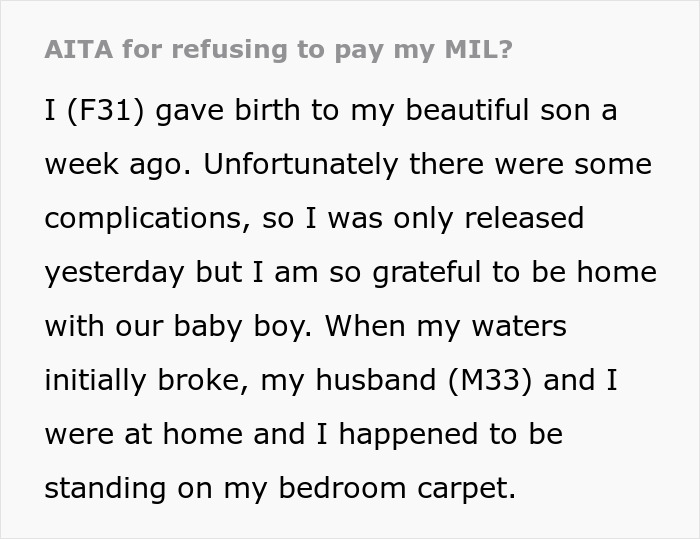

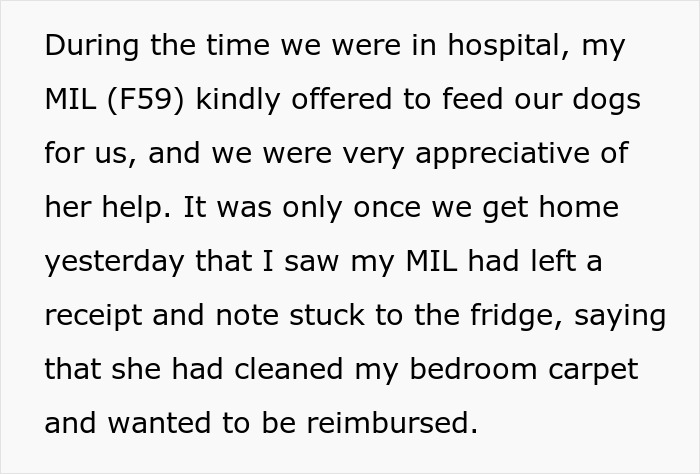


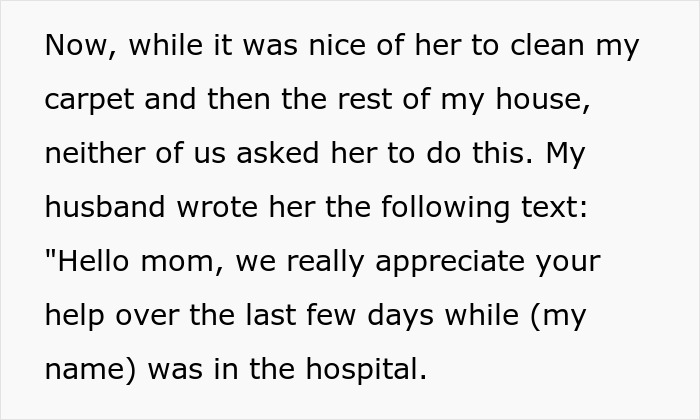


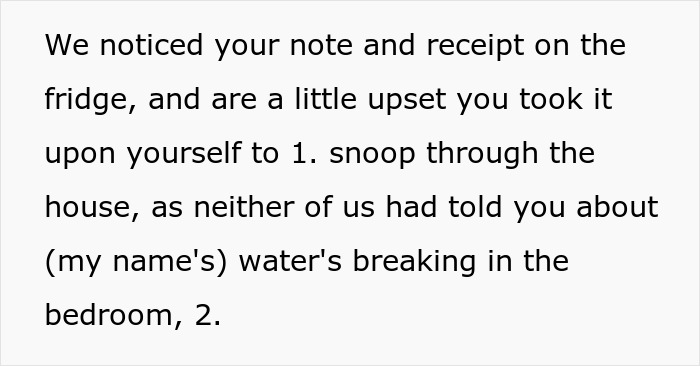


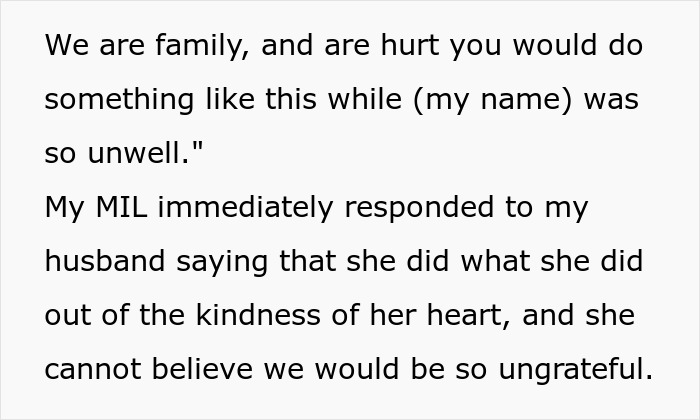

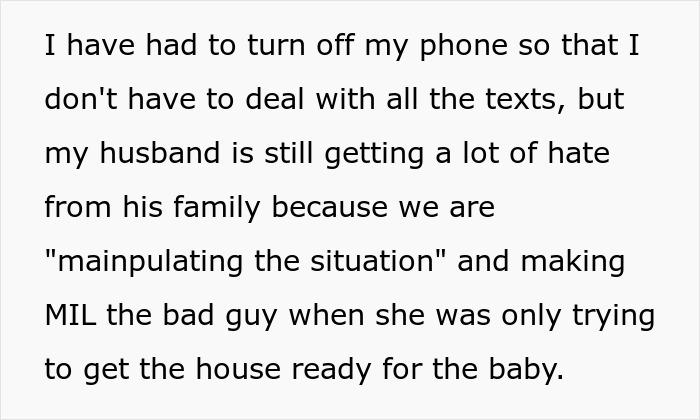





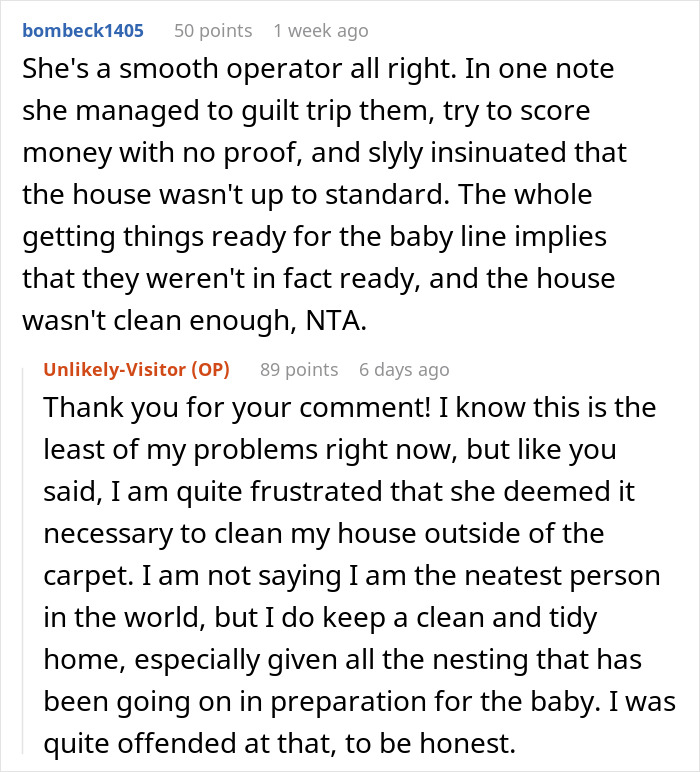
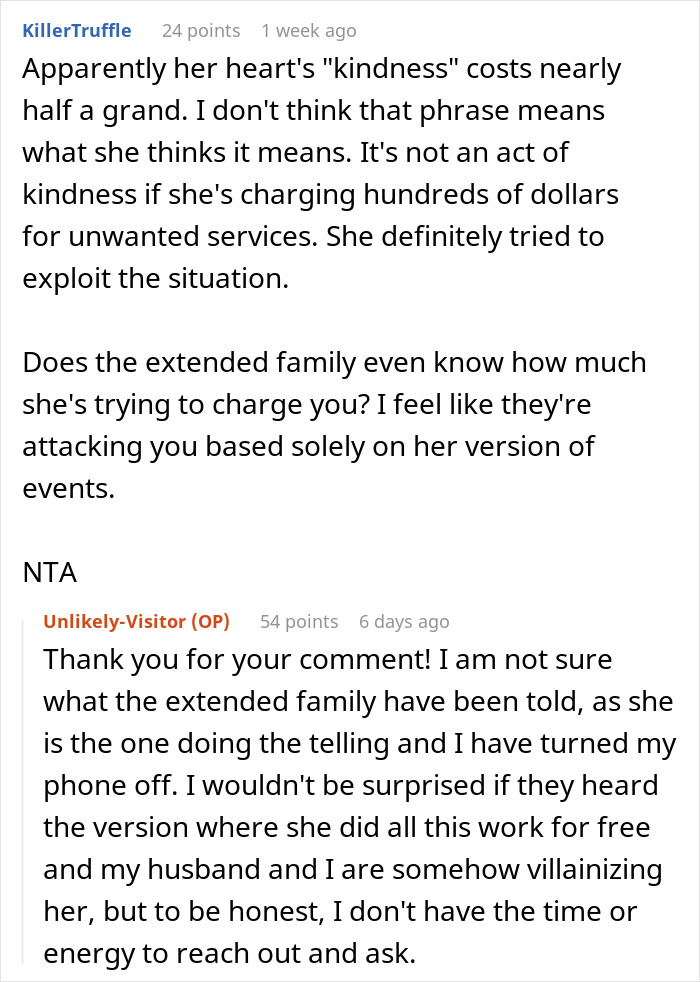
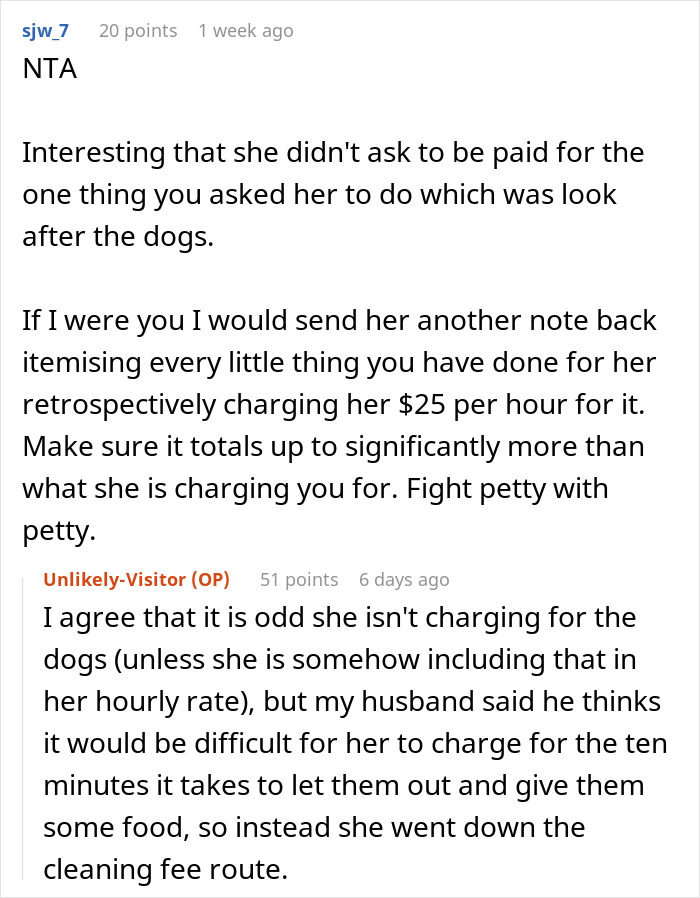
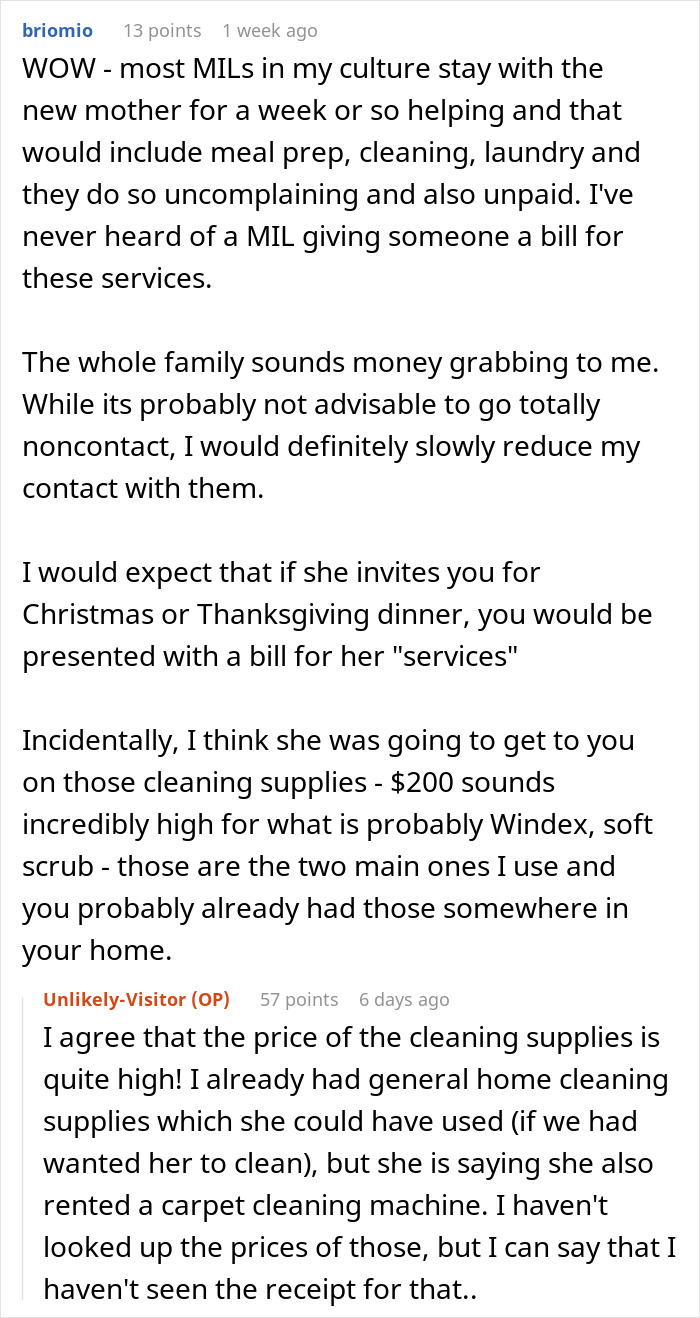
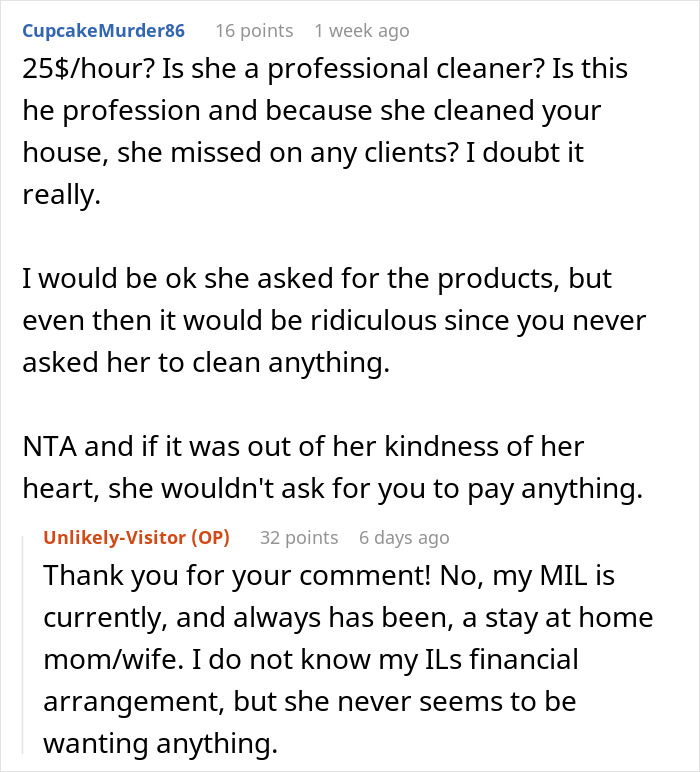
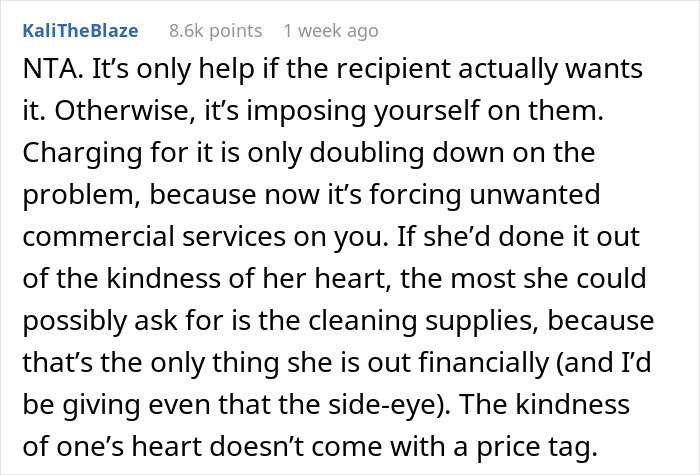
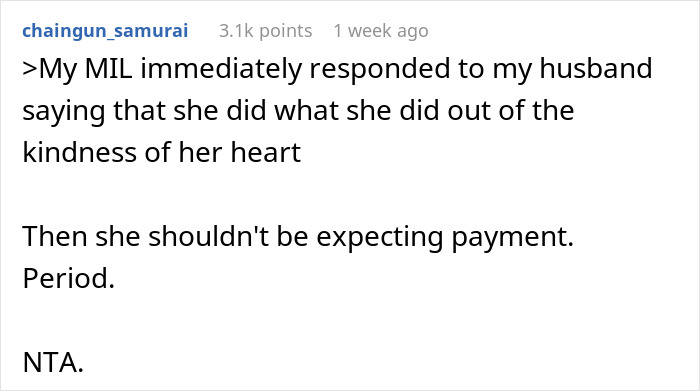
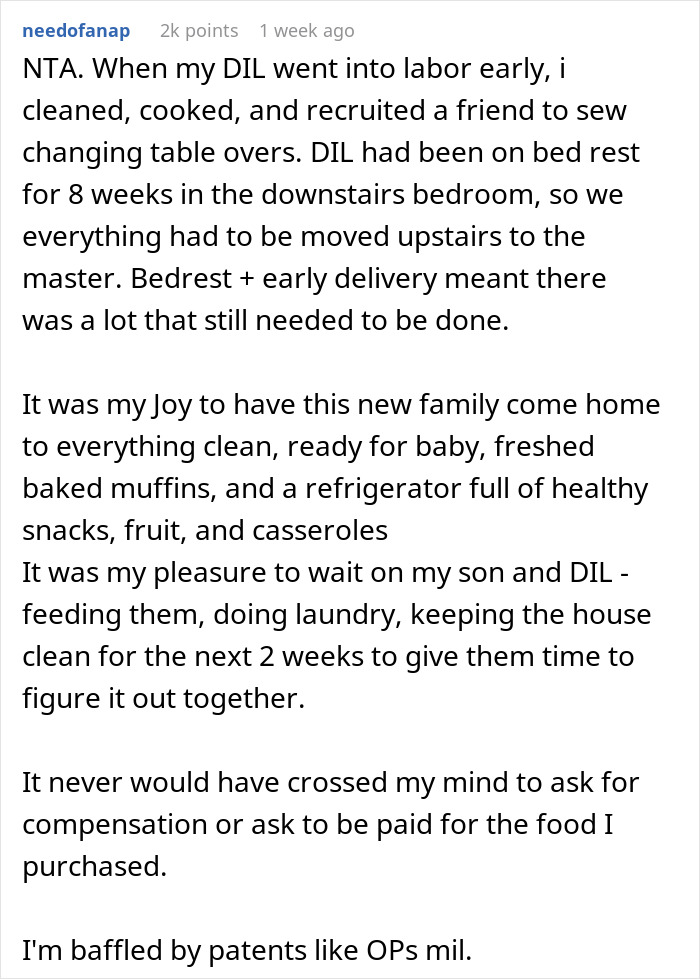

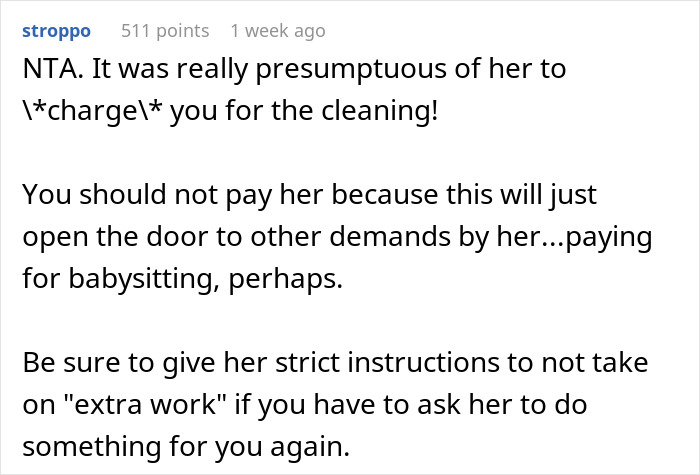











































57
47